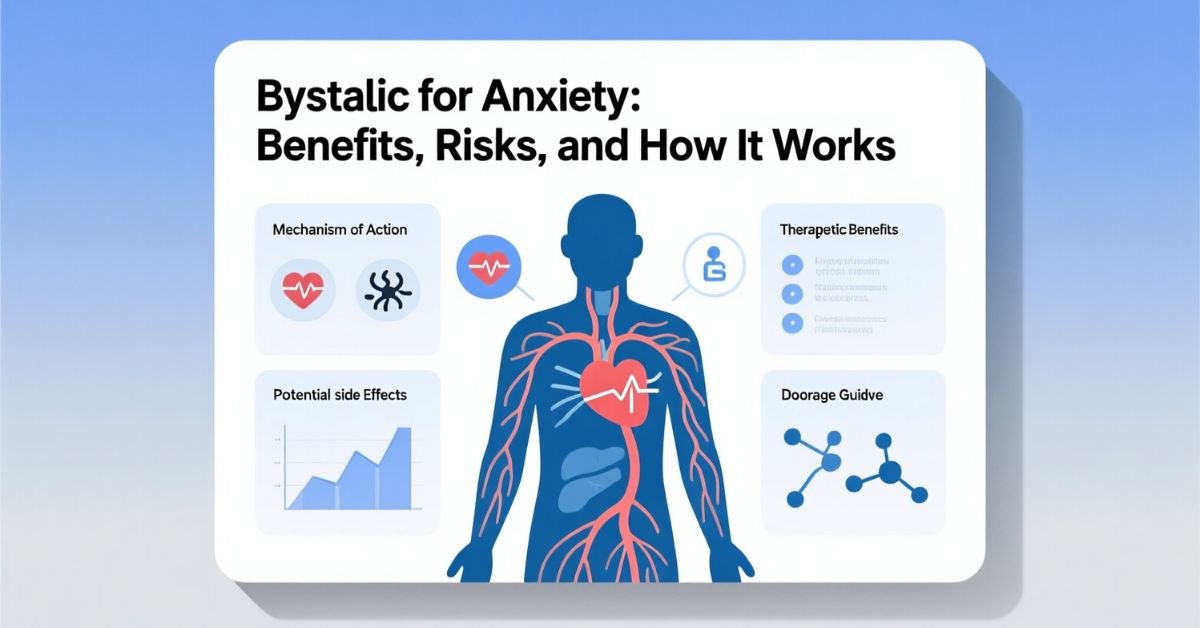Introduction
The Bystolic medication is typically prescribed to treat high blood pressure.It belongs to the beta-blocker family, which works by slowing the heart rate and easing the strain on blood vessels. Recently, people have started asking if doctors also recommend bystolic for anxiety, especially when symptoms involve a racing heartbeat, shaking hands, or sweating.
Anxiety can feel overwhelming and exhausting. Many people search for safe and effective treatments beyond standard anti-anxiety drugs. This is where interest in bystolic for anxiety comes in. The drug may help reduce the physical effects of stress, which often fuel emotional symptoms.
In this article, we’ll explore how Bystolic works in the body, its potential benefits for managing anxiety, the possible risks and side effects, and whether it’s the right option for you to discuss with your doctor.
How Does Bystolic Help With Anxiety?
Bystolic, which belongs to the beta-blocker class of medicines, is usually given for high blood pressure.It helps lower the heart rate and eases tension in the blood vessels. When anxiety makes the heart race or causes shaking and sweating, bystolic for anxiety may help reduce these physical effects. This can give the body a calmer response, which sometimes makes the mind feel more at ease.
It’s important to know that this medicine does not cure the root cause of anxiety. Instead, it focuses on easing the symptoms that come from the body’s stress reaction. People who experience fast heartbeat, trembling, or pressure in social situations may find bystolic for anxiety useful when other treatments are not enough. Doctors may consider it for patients who have both high blood pressure and anxiety-related symptoms.
Nebivolol for Anxiety: Doses, Benefits, and Risks
Nebivolol is a medication mainly prescribed to treat high blood pressure. Some doctors may also consider it for anxiety when fast heartbeat or shaking is a problem. The dose for anxiety is usually lower than what is used for heart conditions.This medicine must always be used exactly as directed by a doctor
The benefits of nebivolol include a calmer heartbeat, less trembling, and fewer physical signs of stress. But there are risks too. Side effects may include dizziness, fatigue, or trouble sleeping.People with some medical conditions may not find this medicine safe. That is why it’s important to talk to a doctor before using nebivolol for anxiety.
Beta-Blockers and Anxiety
Beta-blockers are drugs that reduce the heart rate and help lower blood pressure. They are mainly used for heart problems, but doctors sometimes recommend them for anxiety too. Anxiety often causes a fast heartbeat, shaking hands, or sweating. Beta-blockers can reduce these symptoms and help the body feel calmer.
They do not fix the root cause of anxiety, but they can make stressful moments easier. For example, people use them before public speaking, exams, or social events. One option is bystolic for anxiety, which may ease racing thoughts by controlling the physical signs of stress. The possible benefits of using a beta-blocker like bystolic for anxiety include:
- Slower and steadier heartbeat
- Less trembling and shaking
- Reduced sweating
- More control in stressful situations
Nebivolol for Anxiety: What You Should Know
Nebivolol belongs to the beta-blocker group and is often used to lower blood pressure. Some doctors also consider bystolic for anxiety because it can calm physical stress symptoms. It may help with fast heartbeat, trembling, or sweating that often come with anxious moments.
Still, bystolic for anxiety is not a first-choice treatment. It should only be taken under medical advice. Knowing its benefits, side effects, and risks can help you decide if it’s the right option to discuss with your doctor.
Nebivolol (Bystolic) for Anxiety: Key Information
| Aspect | What You Should Know |
| Primary Use | High blood pressure (hypertension) |
| Off-label Use | May be used for anxiety symptoms like rapid heartbeat, trembling, or sweating |
| How It Works | Slows the heart rate, relaxes blood vessels, reduces physical stress responses |
| Potential Benefits | Calmer heartbeat, less shaking, reduced sweating, more control in stressful moments |
| Risks & Side Effects | Dizziness, fatigue, headache, nausea, trouble sleeping |
| Who Should Avoid It | People with asthma, very low heart rate, severe heart failure (unless advised) |
| Interactions | May interact with diabetes drugs, heart medicines, or alcohol |
| Doctor’s Advice Needed | Always required before using nebivolol for anxiety |
| Brand Name | Sold as Bystolic in many countries |
Nebivolol Dose for Anxiety
Nebivolol is a beta-blocker most often used for high blood pressure, but sometimes doctors consider bystolic for anxiety when symptoms are linked to a fast heartbeat or trembling. The dose for anxiety is usually lower than what is prescribed for heart conditions. It works by calming the body’s stress response so that anxious feelings become easier to manage.
The right dose of bystolic for anxiety depends on a person’s age, health, and medical history. Doctors usually start with the lowest effective amount and adjust only if needed. Taking more than prescribed can cause dizziness, fatigue, or very low blood pressure. This is why it is important to follow medical advice and never self-adjust the dose.
Nebivolol Safety and Side Effects
Nebivolol is usually safe when taken as prescribed, but it is not for everyone. People with asthma, very slow heart rate, or severe heart problems should avoid it unless their doctor says otherwise. It should also be used carefully in people with diabetes or kidney issues.
Common side effects may include dizziness, headache, tiredness, or trouble sleeping. Some people may also notice stomach upset or cold hands and feet. Serious side effects are rare but need medical attention. You should always get medical advice before using or discontinuing nebivolol.
Interactions With Other Medications
When considering bystolic for anxiety, it is important to know that it can interact with other medicines. These combinations might increase risks or reduce the benefits of the medicine. For this reason, you should always tell your doctor about all the medicines, vitamins, or supplements you are taking.
Some medicines that may interact with bystolic for anxiety include:
- Heart medicines like digoxin or other beta-blockers
- Diabetes drugs that lower blood sugar
- Antidepressants such as SSRIs
- Asthma or COPD inhalers
- Blood pressure medicines like calcium channel blockers
- Alcohol, which can make dizziness or tiredness worse
Is Nebivolol Right for You?
Nebivolol may be helpful if you have high blood pressure and also struggle with anxiety symptoms. It can calm a racing heartbeat and reduce trembling. However, it is not the right choice for everyone. People with asthma, very slow heart rate, or certain heart conditions may not be able to take it safely.
The best way to know if nebivolol is right for you is to speak with your doctor. They can check your health history, current medicines, and overall needs. Never start or stop nebivolol without medical advice. Your doctor can help you find the safest and most effective option for your anxiety.
Conclusion
Nebivolol, also known as Bystolic, may help some people with anxiety by calming physical symptoms like a fast heartbeat or shaking. It is not a cure for anxiety, but it can make stressful moments easier to manage.
The decision to use it should always be made with a doctor. Everyone’s health is different, and what works for one person may not work for another. Talking openly with your doctor is the best way to find out if this medicine is the right choice for you.
FAQs
1. What is Bystolic used for?
Bystolic is mainly prescribed to treat high blood pressure but may also be considered for anxiety symptoms.
2. Can Bystolic help with anxiety?
Yes, some doctors may prescribe Bystolic off-label to reduce physical symptoms like a racing heartbeat or trembling.
3. What are the common side effects of Bystolic?
Common side effects include dizziness, fatigue, headache, or trouble sleeping.
4. Is Bystolic safe to take with other medicines?
It may interact with certain drugs, so always check with your doctor before combining it with other medications.5. Should I stop Bystolic if I feel better?
No, never stop taking Bystolic without your doctor’s advice, as it can affect your heart and blood pressure

